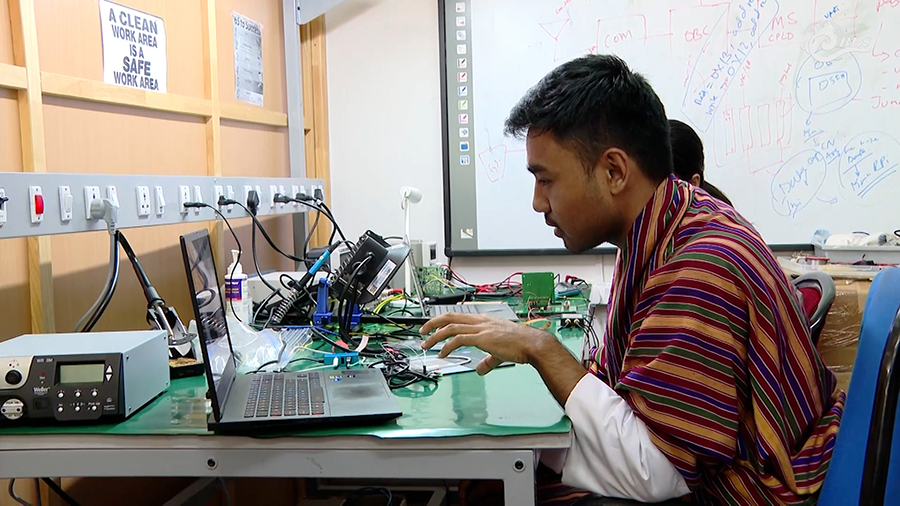 Bhutan will launch a joint satellite with Japan’s Chiba Institute of Technology next year. Students from the Royal University of Bhutan are playing a key role in this mission. Two students from the College of Science and Technology recently left for Japan to work on the satellite at Chiba Institute of Technology. The joint satellite project is part of a five-year Memorandum of Understanding between the GovTech Agency and Chiba Institute of Technology, focusing on satellite research and capacity building.
Bhutan will launch a joint satellite with Japan’s Chiba Institute of Technology next year. Students from the Royal University of Bhutan are playing a key role in this mission. Two students from the College of Science and Technology recently left for Japan to work on the satellite at Chiba Institute of Technology. The joint satellite project is part of a five-year Memorandum of Understanding between the GovTech Agency and Chiba Institute of Technology, focusing on satellite research and capacity building.
 It is the final day before two Bhutanese students head to Chiba Institute of Technology in Japan to work on a joint satellite project.
It is the final day before two Bhutanese students head to Chiba Institute of Technology in Japan to work on a joint satellite project.
Diwas Pradhan and Sonam Yangzom, both 22-year-olds, are brushing up on their payload they have been developing for about six months.
A satellite’s payload is the main equipment or instruments that the satellite carries to the Earth’s orbit to perform its intended mission.
The team, consisting of five students from CST and one from Sherubtse College, has been designing, developing and assembling the payload.
 “We are basically going to do the integration of the payload that we have developed to their actual satellite, which is developed by Japan. So, regarding the missions, our payload has three objectives. One of the objectives is to capture the image of the Earth. Second is to monitor ozone health, and third is to do a magnetic study from outer space,” said Diwas Pradhan, Team Leader, CST.
“We are basically going to do the integration of the payload that we have developed to their actual satellite, which is developed by Japan. So, regarding the missions, our payload has three objectives. One of the objectives is to capture the image of the Earth. Second is to monitor ozone health, and third is to do a magnetic study from outer space,” said Diwas Pradhan, Team Leader, CST.
The team was selected last year by the GovTech Agency.
 “Last winter vacation, GovTech came to our college for a workshop, which was for a joint satellite project with Chiba Tech. So, during the workshop, we had a brainstorming session and had group presentations. Through a merit ranking, we were fortunately selected, and then we got the opportunity to work at Chiba Tech,” said Sonam Yangzom, Student, CST.
“Last winter vacation, GovTech came to our college for a workshop, which was for a joint satellite project with Chiba Tech. So, during the workshop, we had a brainstorming session and had group presentations. Through a merit ranking, we were fortunately selected, and then we got the opportunity to work at Chiba Tech,” said Sonam Yangzom, Student, CST.
“Our team basically has worked from scratch. We didn’t know much about how the satellite operates, and it’s been seven months working on this project, and now we have a much better idea of how a satellite works and how it is communicating between the ground system and everything,” said Tshewang Tashi, Student, CST.
 Today is their first day of work at Chiba Institute of Technology.
Today is their first day of work at Chiba Institute of Technology.
Diwas and Sonam will be working for ten days to integrate the payload into the satellite bus, alongside students of the Japanese university.
As part of the five-year MoU, each year, a new payload developed by students under RUB will be launched with a satellite built by Chiba Institute of Technology.
“This is a very exciting programme because in Bhutan, we don’t have a space satellite programme in our tertiary institutions. With this collaboration, our students are getting the opportunity to work end-to-end in building satellites,” said Jigme Tenzing, Secretary, GovTech Agency.
The GovTech Agency also shared that they might hire these students in the future to continue working on similar projects.
“We hope that this will excite our youth, taking up STEM projects, not only to get a degree in science, technology and engineering, but also to have the opportunity to do something meaningful that can have an impact on society. And maybe also play a role in His Majesty’s vision for GMC,” said Jigme Tenzing, Secretary, GovTech Agency.
He added that the project aligns with His Majesty’s vision to inspire youth to pursue STEM subjects and build Bhutan’s potential to gradually develop larger commercial satellites.
Devika Pradhan
Edited by Phub Gyem








